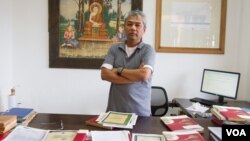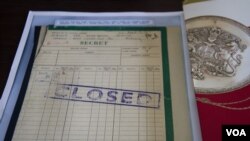The former biographer to late King Norodom Sihanouk is donating his personal archive to the Documentation Center of Cambodia, a group that researches Khmer Rouge atrocities.
The biographer, Julio Jeldres, became a pen pal to the monarch in 1967 and did not meet him until 1981. But over the decades, including 12 years as the late king’s private secretary, he amassed a collection of research materials, from videos and photographs, to interviews, papers, and books. Taken together, they will help explain the country’s mercurial leader, who died in 2012 but remains beloved by many Cambodians, and key parts of its history.
“I decided to donate my personal archives to [the center] because I feel that it is an institution in Cambodia which has the means and trained staff to make these materials available to future generations of Cambodians in the first place and then to foreign researchers,” Jeldres said in an email.
Youk Chhang, executive director of the Documentation Center, said the donation will add to the institution’s resources, as it continues to gather materials from students, scholars and researchers. The archive can help many different people, from student researchers to diplomats, understand decisions that were made in the past, he said.
The center continues to record history, through individual and state documents of high value, he said. “Crime is happening everyday, so we have to collect the documents to keep them as historical documents,” he said.
Jeldres’ archive, reaching from 1950 to 2010, includes information on Cambodia’s foreign policy and its relations with the US, Thailand, Vietnam, the Vietcong and others in what was then Indochina. It also includes documents from 1954 and US aggression in Southeast Asia, and the late monarch’s correspondence with regional leaders, ambassadors, commanders, heads of state and others.
“All these documents show the truth of [events] that happened,” Youk Chhang said, as he looked through the material at the offices of the center recently. “Sometimes we hear, or we read newspapers. Sometimes we do not know what the leaders talked about 30 years ago.”
Some documents were only recently declassified, some as recently as 2011.
“For the last four years only a small number of people have read these documents,” he said, perusing the archive. “These documents talk about China and Cambodia during Khmer Rouge, in 1978, which is pivotal in the decline of Khmer Rouge and the cause of Vietnam coming to Cambodia.”
The archive will be catalogued and recorded and then made available to the public, part of the center’s ongoing efforts to help Cambodia understand its past. “If we do not understand our history clearly, we won’t know ourselves,” Youk Chhang said. “And society will face the disasters and plights that we’ve gone through in the past.”









